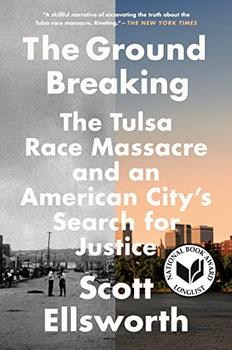Summary | Excerpt | Reviews | Beyond the Book | Readalikes | Genres & Themes | Author Bio

An American City and Its Search for Justice
by Scott EllsworthChapter 1
1921
Close your eyes and you can almost hear them.
It's a Thursday afternoon on a long-ago spring day. In the alleys and on the back porches it is still jacket weather. For even though the dogwoods and redbuds are in bloom, and bursts of sparrows explode out of the trees and bushes, in the shadows there's a lingering coolness in the air. Only they don't care. For today is the maids' day off and they've congregated, in twos and threes and fours, to stop and gossip along the sidewalks and storefronts. Gone are their uniforms, the long white aprons and striped dresses and peaked caps. Gone are the mops and the dust rags, the yes ma'ams and the no sirs, and the lye soap, starch, and bluing. In their place are smiles and laughter, felt hats and bobbed hair. Today is a day to exhale.
They aren't the only ones out and about. Up and down Greenwood Avenue, a small parade of humanity can be seen. There are ditchdiggers and shop owners, a mother with young children, an old man-born a slave-with ancient eyes and an ash-gray beard. Preachers and hustlers, doctors and dishwashers, a newspaper reporter, a uniformed messenger, and a deputy sheriff can all be found within a five-block radius. Some are getting off work, others are shopping. From a window up above drifts the sound of a Victrola. Maybe it's Mamie Smith, the Harlem singing sensation, belting out "Crazy Blues." Or maybe it's a rag or a Mozart piano sonata. In a second-floor office in the Williams Building, a dentist carefully sets a burr into his drill. Two doors down, an attorney inks one last contract for the day and hands it to his secretary.
Welcome to Greenwood. Spring, 1921.
We are in Tulsa's African American district, home to fourteen churches, two schools, a hospital, a post office substation, four hotels, two newspapers, and at least ten thousand residents, with the number swelling each week. A dozen physicians and surgeons live and work in Greenwood, as do lawyers, insurance agents, real estate salesmen, and pharmacists. In the shops you can buy dresses and three-piece suits, straw hats and bench-made shoes, pipe tobacco and household goods, tools and typewriter ribbon, perfume, eyeglasses, and bottles of patent medicine. There are ten tailors, four shoe repair shops, one filling station, and one feed store. Nor does the district lack opportunities for entertainment. The Dixie Theater seats more than a thousand, while the Dreamland has seating for 750. Both offer motion pictures, musical performances, lectures, and vaudeville acts. Nearby are pool halls and speakeasies.
This is no food desert. There are thirty-eight grocery stores, fruit and vegetable stands, and meat markets. Thirty restaurants serve everything from sandwiches and plate lunches to steaks and chops with all the trimmings. There's the Red Wing CafŽ and Kelley's Lunch Counter, the Waffle House and Doc's Beanery, as well a slew of double-named eateries-Bell & Little, Grace & Warren, Hardy & Hardy, Newman & Howard, White & Black, White & Brown, Wright & Davidson-where ditchdiggers and dentists, chauffeurs and custodians all sidle up to the counter and place their orders. Afterward, diners can pick up some smokes at the Oquawka Cigar Store, or a bag of sweets or some ice cream at Loula Williams's confectionery.
It is said that in Greenwood, a dollar bill will change hands a dozen times before it ever leaves the district. But equally important, its residents need not face the indignities heaped upon them at the white-owned shops downtown-the sighs and furrowed brows of the impatient white clerks, the ones who follow you down the aisles, then won't let you try on clothes beforehand. Here in Deep Greenwood, as the main commercial blocks are called, African American shoppers can purchase clothes at Black-owned stores, drop off their dry cleaning and laundry at Black-owned cleaners, and have their portraits taken in a Black-owned photography studio. Here, there are Black doctors and Black nurses, Black teachers and a Black principal, Black plumbers and Black house carpenters. Whites sneeringly call the district "Little Africa," or worse.
Excerpted from The Ground Breaking by Scott Ellsworth. Copyright © 2021 by Scott Ellsworth. All rights reserved. No part of this excerpt may be reproduced or reprinted without permission in writing from the publisher.




Read the best books first, or you may not have a chance to read them at all.
Click Here to find out who said this, as well as discovering other famous literary quotes!
Your guide toexceptional books
BookBrowse seeks out and recommends the best in contemporary fiction and nonfiction—books that not only engage and entertain but also deepen our understanding of ourselves and the world around us.